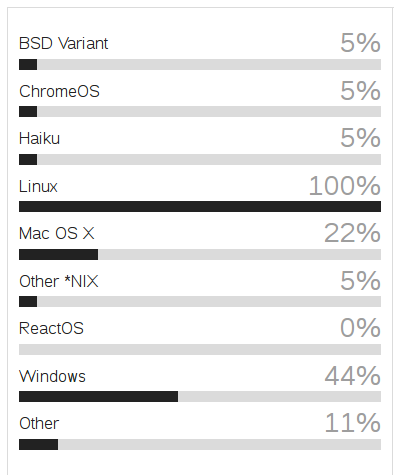Same here. FreeDOS could have been one of the main options. As beautiful an OS as Haiku will be one day, I suspect there are currently far more FreeDOS users.
Very interesting that there are other *NIX users but no one for BSD as of now. I mostly use Linux and Windows, but I have used HP-UX before–a very old school UNIX. I didn’t realize how much I miss using the “modern” GNU utilities every time I’ve used it.
Lol, looks like there’s something wrong with the poll. Currently at 197% out of 100%
Nah; you can vote for multiple OSes ![]()
Percentages in this case mean “out of all the voters, how many have X”. Therefore, all voters claim to use Linux, a 22% of the voters use OS X, etc. A problem would arise if the total amounted over 900% (9 options * 100%) hhahaha.
I run Debian on my laptops and FreeBSD (actually pc-bsd) on my desktop. Wife’s laptop runs Mint and her desktop runs Debian.
I would say that most of us clicking Windows is due to the fact that this is the OS we have to use at work…or to play any Blizzard title.
Someone’s actually running Haiku? Beard.
Ubuntu is Linux, no matter what their marketing team doesn’t say. Let me pose what I would consider a better question - how is Ubuntu not Linux?
Certainly it is. As is Android. You’d agree with that too, yes? And so are routers which run the Linux kernel, and IoT devices that run the Linux kernel. All Linux. I agree. But I don’t think that that’s a useful term, in this case; it hardly excludes anything.
Are they desktop operating systems though, as per the poll? Is Ubuntu?
To me at least it all it all depends on what for you defines an OS.
Windows is not an OS it’s a family of operating systems. Windows 95 and Windows 10 feel very different, though I suspect they have a significant shared code base.
It’s the same with Linux: Linux is just the kernel, what makes the OS is the choice of desktop and the utilities bundled with it Arch and Ubuntu share the Linux and have many common tools but they feel very different and I would not call them the same OS.
A reasonable point, and I’ll withdraw the question about routers and IoT devices. Android comes on desktops now, though, and ChromeOS has a Linux kernel: are those two both Linux?
Sure! I think it’s a symptom of the Linux community being historically focused around openness and GNU-canoe-freeness that we struggle with that as a concept. Linux has always been flexible enough for companies to use it in a less open or less free way.
This is why I always talk in my blog about “Linux distributions” (I guess everyone agrees Android is a Linux distribution: it distributes something based on the Linux kernel) or sometimes I even go for the “Linux-based systems” route. However, I’ve found that it is much better to just talk about individual systems so that nobody may yell at me that certain command I exemplify for Arch doesn’t work on Debian.
'zactly. It’s jolly hard to come up with a definition of “Linux” which includes Fedora and OpenSuse and Arch, excludes Android and Chrome OS, and doesn’t also exclude Ubuntu. I’m fine with that; people who talk about “Linux” tend to be doing so in a way that attempts to castigate the Ubuntu desktop for having features that other desktops do not have (or not having features that they do), so I save myself time and mental effort by thinking of “Ubuntu” and “Linux” as two separate but distinct things, rather than one being a flavour of the other.
The idea of Ubuntu being considered different from the other distros you’ve mentioned is a bit weird to me. I’m a long-time Kubuntu user, am I using Ubuntu or not? The Unity controversy passed me by, as did the search privacy controversy. Mir has been raised as an issue for maintaining compatibility with other desktops in the past but so far it hasn’t eventuated. I can’t see how my experience of using KDE on Ubuntu is materially different from using KDE on Fedora, OpenSuse or Arch.
Agreed, it likely isn’t. I admit that when I say “Ubuntu” I mean “the default Ubuntu setup, with Unity as the desktop”.
The difference between “Linux” and “Android” and the rest is that when people talk about “Linux” they really mean a suite of software that is developed by myriad different groups, such as X11 from the x.org project, some kind of default shell, a whole suite of utilities cloned from AT&T UNIX by the GNU project, and not to mention some distribution-specific packaging tools and graphical programs like Unity, KDE, and what not. Can you have those things in Android? Sure, there’s always an app for that, but it’s not the default Android experience.
Systems as complex as Linux distributions really are more than the sum of their parts, so it becomes hard to talk about Fedora and Ubuntu and Suse and Android as if they are just “Linux”. That’s like saying we’re all just atoms and molecules floating around in space 
I’d put BSD-derivative and include OS X there, just to read all the crying from mac users.
